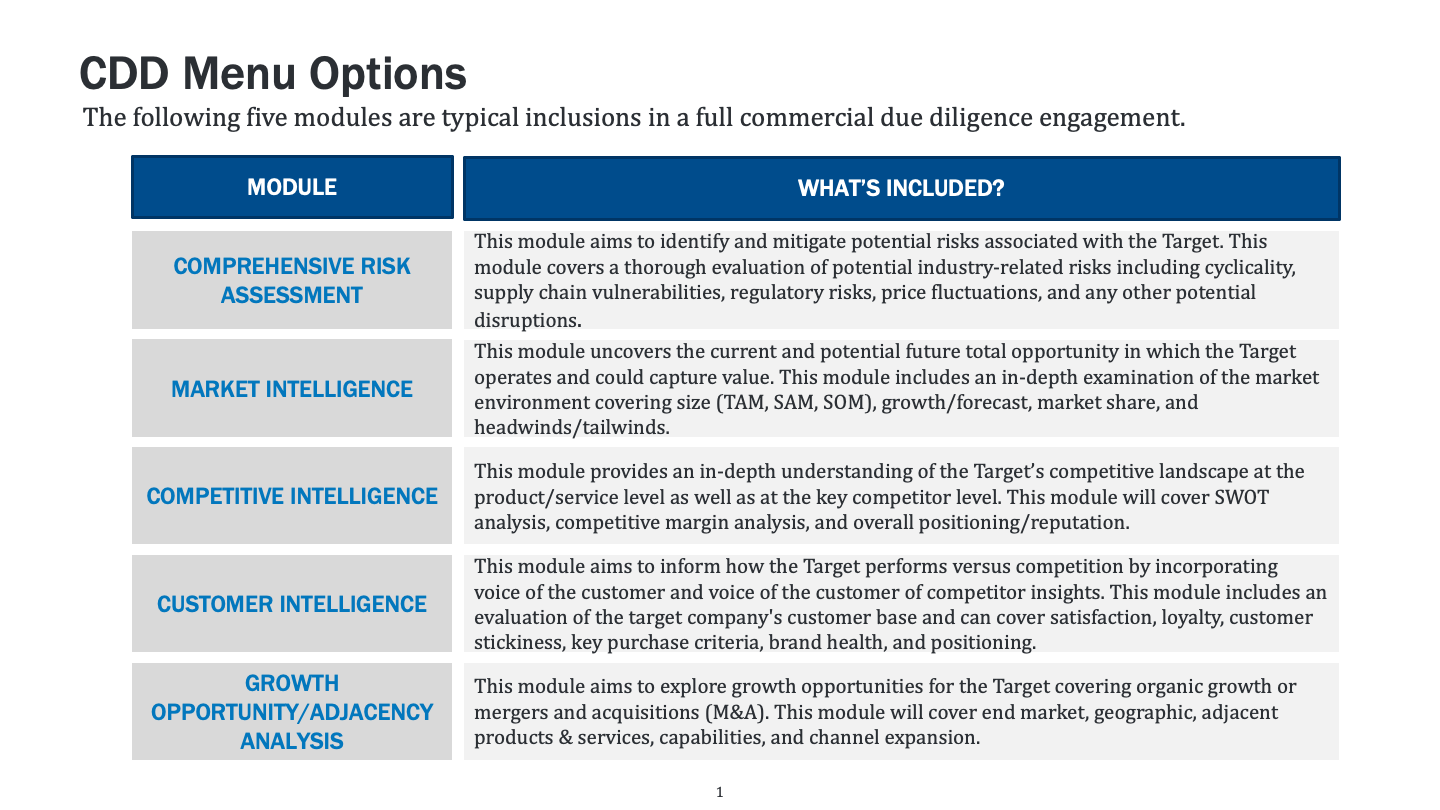By Rick Claar and Josh Emington
In previous installments, we’ve examined the importance of expert-led Commercial Due Diligence (CDD) to de-risk private equity investments and explored how a Deal Thesis can set the stage for effective deal analysis. However, it is important to point out that, of course, no two deals are the same. Many of our clients specifically call out their appreciation for the ability to tailor their program of investigation to specific risks, information needs, and business objectives rather than relying solely on a rigid pre-designed program.
That said, there are common pillars (or modules) of CDD that we find are popular/common in the majority of our engagements:

In the next few installments of our ongoing series exploring CDD in the Private Equity space, we will provide additional granularity on each of these modules, including value, methods, tactics, frameworks, use-cases, obstacles, and outcomes. Before we dig into the details on these leading pieces, it is useful to showcase some of the accessory investigations that investors will select to add-on to their study to make certain that analysis is complete, accurate, detailed, and tailored specific to their own investment and desired outcomes.
No More Cookie Cutter
Having served general partners in the private equity space for decades, Martec has worked with more than a few clients who had prior experiences with consultants that were too rigid. It’s not uncommon for us to hear words to the effect of, “We need more than a cookie-cutter approach. Our deal, target, and/or market are so niche and unique that the diligence requires a different approach.”

While the broad buckets in the chart above are inclusive and representative, they are not meant to be considered comprehensive. In fact, there are a number of the additional modules investors may wish to explore for a more fulsome and customized Commercial Due Diligence effort, knowing that much is at risk, but that there is much to potentially gain as well.
Below is an accounting of such “add-on” modules that may be appropriate to consider, depending on the potential deal’s niche, market, or particular circumstances — grouped categorically (though many of these can cross both category and overall module, as charted at the beginning of this article). Hopefully reviewing the modules below sparks productive conversation during the scoping stage of your next diligence phase to pursue the most appropriate and actionable collection of research and consulting themes to address your deal specific risks, growth opportunities, and business objectives:
Solution-Related Modules
- Product Diligence – Assessing the target’s product/solution portfolio to examine potential evolution, innovation (or even potential obsolescence), based on the underlying technology, existing intellectual property assets, and overall product category. This module is useful to determine the feasibility and defensibility of the product roadmap, as well as the threat of disruption by other “minnow” innovators who may not be obvious, but for close examination.
- Pricing Strategy – Capturing the competitive pricing context (model and level by region), to determine optimal price positioning for the target, understand willingness to pay, competitor pricing strategies and more. Common analyses conducted include Price-Value Mapping, Benefit-Value Analysis (a methodology developed by Martec Group), Competitive Price Benchmarking, and more.
Supply-Chain-Related Modules
- Supplier Analysis – Studying the security of supply, evaluating potential vendor partnerships, conducting cost analysis and more to clearly understand which supplier(s) in the supply landscape will provide the optimal outcomes for the target.
- Supply Chain Analysis – Identifying players at each step in the value chain to clarify vertical integration opportunities. For example, when a B2C target is considered, there are often online and brick-and-mortar retail channels with important B2B buyers to engage and understand, up and down the supply chain.
- Distribution & Logistics Optimization – Exploring the target and target market’s logistical and distribution channels and methodologies to identify opportunities for future value creation. Such analysis follows the full lifecycle — Manufacturer > Distributor > Customer — to better understand modes of travel, packaging details, distribution channels, existing and potential partners, associated and future costs, and so on.
Strategic Consulting Modules
- Strategic Assessments – For example, conducting model conversion for multiple expansion by facilitating a pivot from conventional pricing models to a recurring revenue or subscription-based model, to cite just one example of a Strategic Assessment module that can be explored.
- Strategic Consulting Workshops – Additionally, Martec may facilitate “Decision Making Workshops to help leadership prioritize organizational strategic decision making. Outcomes include 100-day plans, short- and long-term roadmaps, as well as executive summaries that provide workshop conclusions and recommendations for specific strategy activation. Our consultants also leverage advanced decision-making software to facilitate strategic leadership sessions.
Deep-Dive Risk Modules
- Regulatory Risk Analysis – Understanding existing and potential regulatory environments and how they may impact future value and profitability, such as:
- What are the legal requirements today?
- How are they expected to impact the market and target?
- How are they likely to evolve in the next one to five years?
- Specialized Competitive Benchmarking – Getting very granular to learn specific details about specific competitors, such as what equipment, software, and headcount does a given competitor use to achieve its go-to-market strategy and to produce its product? Understanding the cost-of-goods-produced and -sold by competitors may very well impact the analysis on a target acquisition – positively or negatively.
M&A Roadmap Modules
- Flow of Money Analysis – Surveying the broader landscape of mergers and acquisitions within the given space, to better understand:
- Who acquired whom?
- When?
- What does this tell us about the general mapping of this space and the competitive investors within it?
- Roll-Up or Bolt-On Identification – Developing a prioritized matrix to test and chart the feasibility of an inorganic growth strategy, leveraging private company information and data.
Target-Specific Modules
- Business Combination Analysis – Diving deep within target companies to perform synergy analyses (which might apply to employees, solutions, footprint/logistics, go-to-market combination, suppliers, salesforce, value proposition, positioning and more
- Brand Study – Understanding market perception of the target brand by examining it at every potential customer touch point. Common methodologies include customer satisfaction studies (CSAT/CX) Net Promoter Score (NPS), Brand Value Analysis, Brand Awareness, and more. One technique unique to Martec is a Brand Scan leveraging our proprietary Emotion Intelligence methodologies, which assigns numerical Brand Value measurements to emotions experienced by the target’s customers and prospective customers.
Targeted CDD for Targeted Outcomes

As expressed by many investors in today’s increasingly competitive environment, a one-size-fits-all approach to Commercial Due Diligence may no longer be sufficient. As illustrated through the various customizable modules outlined above, tailoring the diligence process to the specific nuances of a target and its market ensures that investors gain a truly comprehensive and actionable understanding. From product viability and pricing strategy to supply chain resilience, regulatory risks, and competitive positioning, each element of the analysis must align with the investor’s unique objectives and risk appetite.
By customizing Commercial Due Diligence, investors can move beyond surface-level assessments and uncover deeper insights that drive smarter, more confident decision making. This level of precision not only mitigates risk but also maximizes the potential for long-term value creation.
In any high-stakes environment, where every detail matters, ensuring that due diligence is complete, accurate, and tailored to the deal at hand is not just beneficial, it’s essential.Stay tuned for installments of our ongoing series exploring CDD in the Private Equity space, as we (fittingly) pursue greater granularity on each of the five primary CDD modules introduced here.
If you wish to discuss any of them sooner, or to identify which add-ons might be appropriate for your next opportunity, please don’t hesitate to reach out to us. Email Rick directly at rick.claar@martecgroup.com and Josh at josh.emington@martecgroup.com.
The post Customizing Commercial Due Diligence to Align with Target and Market-Specific Objectives appeared first on Martec.